Sinus infection is a flue like inflammation which most of the adults encounter. Many parents doubt whether their babies get sinus infection and how to tell if a baby has a sinus infection? It will be helpful if you know about sinus in babies and the ways to treat it.
Sinus infection makes the nasal cavities of your baby infected or inflamed. Sinus infection may be accompanied by various other uncomfortable situations including runny nose, watery eyes, pressure in your forehead and many other.
This article discusses the causes of the sinus infection in babies. It presents the Remedies for sinus infection in babies.
What Is Sinus Infection In Babies?
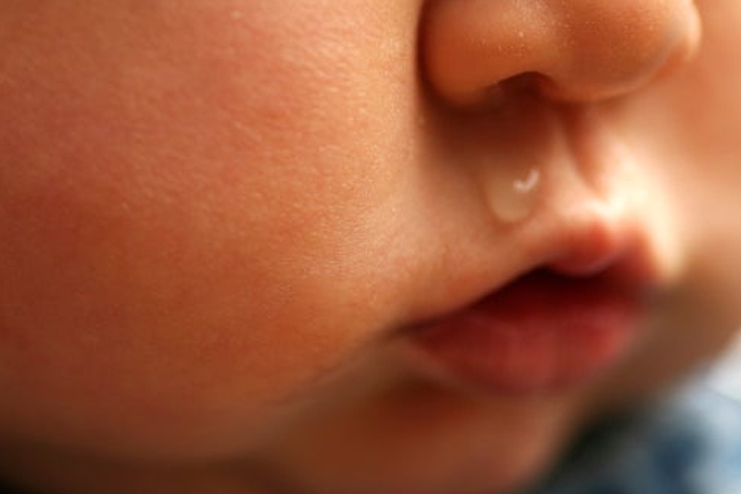
Sinuses are the hollow cavities in the skull. Cheekbones hold the largest sinus cavities known as maxillary sinuses. Frontal sinuses are located near the low center of your forehead.
Sinus infection or sinusitis is a condition in which the cavities around the nasal passages experience inflammation. In other terms, it is the inflammation of the lining of the nose and sinuses. Rhinosinusitis or sinusitis ins the medical term used for the sinus.
Continuous episodes of sinus is common in the people with asthma, cystic fibrosis, and poor immune function.
Viral or Bacterial Sinusitis:
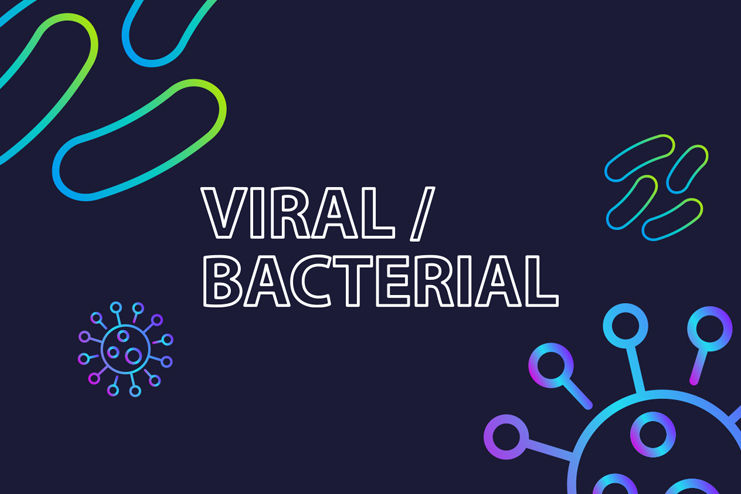
Doctors usually notice the duration of the sinus to determine whether it is viral or bacterial.
A viral sinus infection in babies usually takes five to seven days to improve. Whereas the bacterial sinus infection on the other hand may persist for more than 10 days and may worse after seven days. Antibiotics are used usually to treat the bacterial sinusitis. Bacterial sinus infection can be prevented by the proper treatment of the early sinus infection.
Some of the common signs of the bacterial sinus include:
- Facial pain
- Pus like nasal discharge
- Symptoms that have been residing longer than a week may become irresponsive to nasal medications.
Types Of Sinus Infections In Babies:
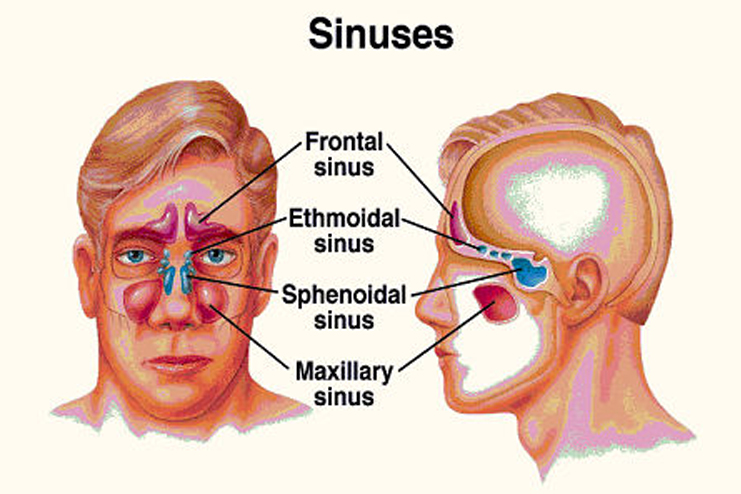
Depending the duration for which the sinus stay, it is classified into following types:
1. Acute Sinusitis: It is the condition in which the symptoms appear for less than four weeks and gradually decrease with the treatment. Acute sinusitis does not require any kind of treatment. It can usually go away on it’s own.
2. Sub acute sinusitis: Symptoms will appear for the duration of 4 to 8 weeks. This condition usually occurs if the previous sinus condition is not properly treated.
3. Long term or chronic sinusitis: This sinus infection will last more than 12 weeks. Both acute and chronic sinusitis can be due to viral or bacterial infections.
4. Recurrent Sinusitis: As the name suggests, this kind of sinus repeats for more than three times in a year. You should consult ENT specialist in this case.
Sinus infections can also be classified depending on the sinus cavity it affects:
a. Maxillary Sinus: It can cause the pain or pressure in the cheek area.
b. Frontal Sinus: It causes pressure and pain in the frontal sinus cavity which is located above the eyes in the forehead.
c. Ethmoidal Sinusitis: It causes pain or pressure between or behind the eyes. This creates pain especially in the sides of the upper part of the nose.
d. Sphenoidal sinusitis: It creates pain or pressure behind the eyes and can often occur at the top of the head.
What Causes Sinus Infection in Babies:
Here are a few reasons for sinus infection in babies.
1. Upper Respiratory Infection:
Your baby is more likely to be affected by the sinus after the episodes of upper respiratory infection or common cold. This infection makes the nasal passages to be inflamed and blocks the opening of the paranasal sinuses.
2. Allergies:
At times allergies may lead to sinus infections because of the increased production of the mucus and the swelling of the nasal tissues.
3. Bacteria:
Blocked sinuses gives the way for the bacteria to grow. This leads to sinus infection. The most common bacteria that causes sinus infections are:
- Streptococcus pneumonia
- Haemophilus influenza
- Moraxella catarhails
4. Other Conditions:
Some other possible causes for the sinus include:
- Being exposed to germs, dust and dirt for longer times.
- Lack of regular vaccinations
- Lack of hygiene
- Tooth infections
- Structural problems in the nose
- Trauma to nose
- Secondhand smoking
- Blocking of foreign objects in the nose
- Enlarged adenoids
Signs & Symptoms of Sinus Infection in Babies:
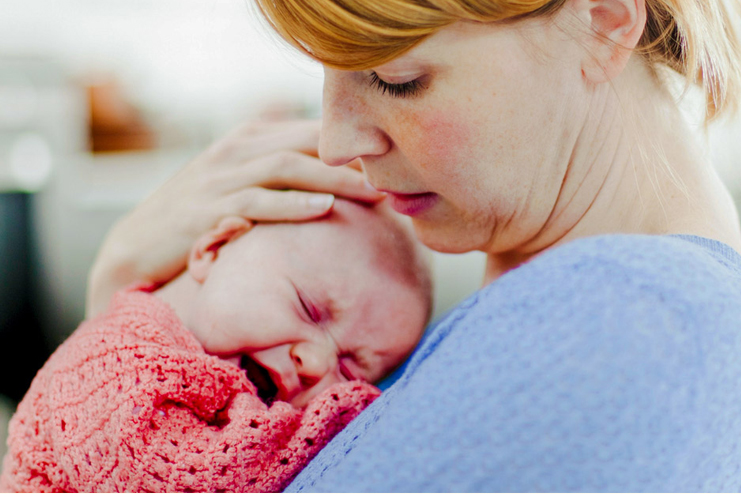
Signs & symptoms that are associated with the sinus infection are:
- Fever/chills
- Runny nose
- Thick yellow green discharge
- Poor sense to smell
- Cough which may worse at night
- Sore or itchy throat
- Headache or facial pain
- Stiff neck
- Watery eyes
- Swelling around the eyes.
Home Remedies for sinus Infection in Babies:
Here are a few natural remedies to relieve the symptoms of sinusitis in your baby:
1. Essential oils:

Studies suggest that spray containing essential oils are the great way for the treatment of sinus infections. Some essential oils like Eucalyptus and peppermint oil helps to clear the airways and clears the congestion. Essential are the best choice to unblock the stuffed nose and to flush out the sinus drainage.
Put a few drops of eucalyptus oil on a cotton ball and hold it a a few inches away from your child’s nose.
2. Steam:
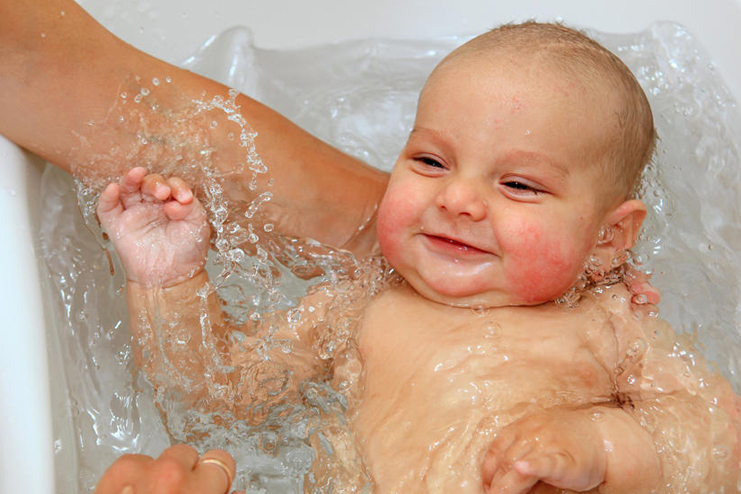
This is one of the best method to make your baby get relief from the sinus infection. Sinus passages can be soothed once the mucus is softened.
For the infants and the young children, turn the bathroom into steam room. Close the doors of the bathroom and put the shower on the hot. Add a few drops of Eucalyptus oil to the bath tub and make your baby to sit in the bath tub for 10-15 minutes. Steam can help to get relief from the uncomfortable sings of the sinus.
3. Hot Soups:
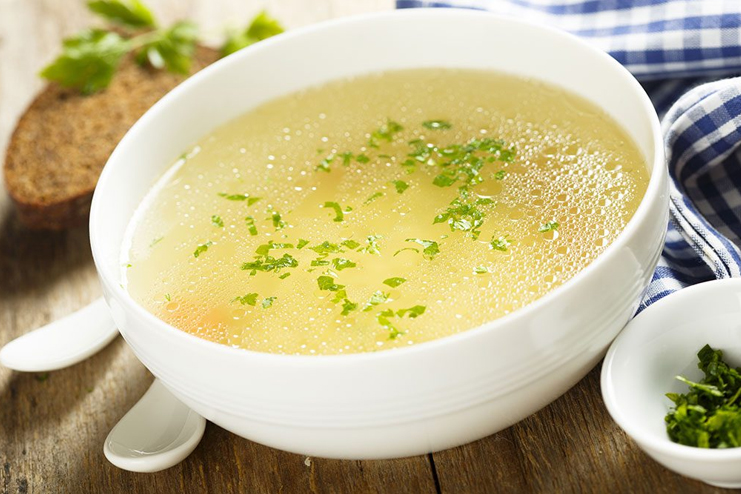
Hot soups helps to get relief from the symptoms of cold. Soups are the combination of the steam with the healthy ingredients.
You can offer chicken soup, vegetable soup, or fresh herbs soup to your one year old baby. Soups are not recommended for the babies below one year who have just started solid foods.
4. Nasal Irrigation:
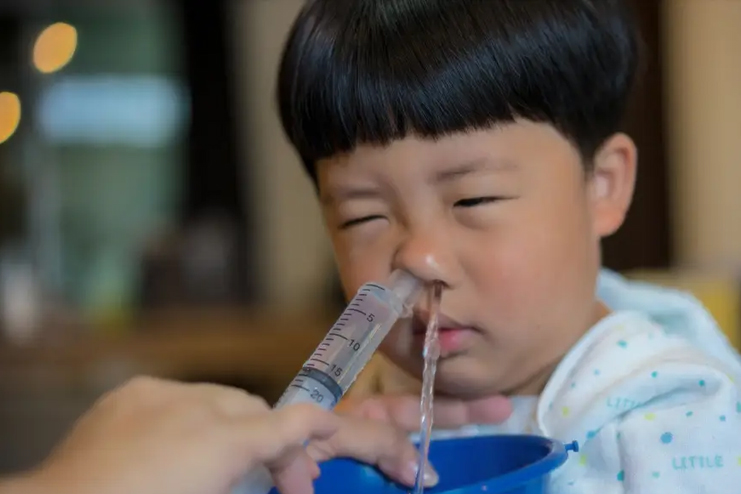
Nasal Irrigation is the more effective way to treat the symptoms of sinus infections. It reduces the severity of the blocked nose. It is a method of flushing out the germs and the blocked mucus with the help of sterilized saltwater solution.
5. Nasal Strips:
Studies suggest that Nasal strips have measurable effect on Nasal Resistance. They are the flexible, spring like bands that are designed to fit right above the nose. As the band try to get back to its original position they life the sides of the nose and clear the nasal passages.
The nasal strips are suitable for the babies above 2 years. Stick a nasal strip when they are sleeping.
Note: Check with your doctor before using the nasal strips as they have some
6. Tea Tree Oil:
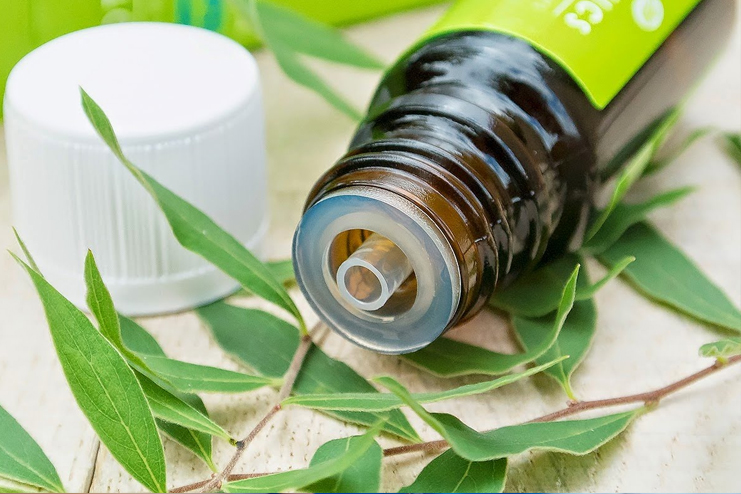
Tea tree oil has many medicinal uses.This oil is helpful to deal with the skin infections. It is used in many deodorants and insect repellents.
It is alternative top the conventional treatment. Mix one drop of tea tree oil to coconut oil or almond oil and apply it on your baby’s nose. Anti bacterial and anti fungal properties present in the tea tree oil will help your baby to fight against the infections.
7. Humidifier:
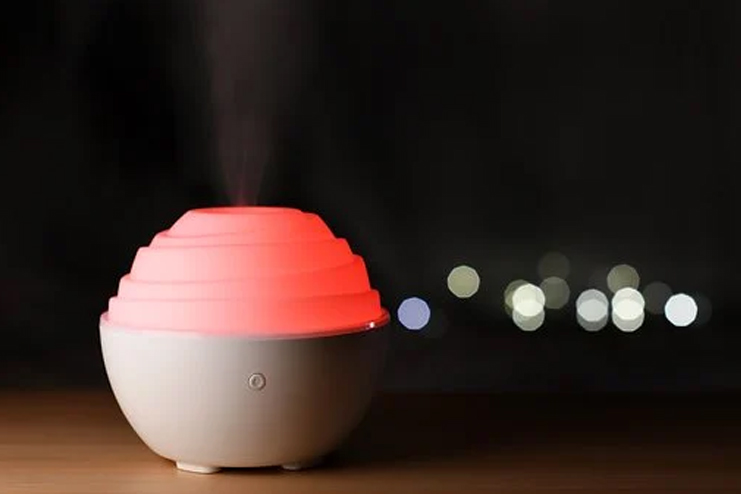 Humidifiers add the moisture to the air and prevent irritation that occur due to the dry air. Humidifiers help the babies to combat sinus infection.
Humidifiers add the moisture to the air and prevent irritation that occur due to the dry air. Humidifiers help the babies to combat sinus infection.
Warm, moist air produced by the humidifier helps to loosen and drive out the mucus. This keeps your baby’s nasal passages clear and free from congestion.
8. Hydration:
Keep your baby hydrated. Make your baby to drink large amounts of fresh juice and water that helps them to stay hydrated.
This is the more natural way of loosening the mucus and clearing your child’s sinuses.
9. Camphor:
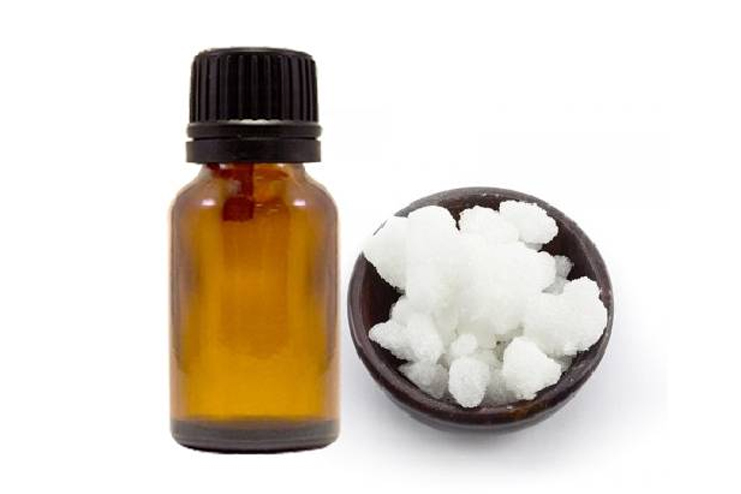
This is one of the best ways to prevent sinus infection in babies. Camphor is used to relieve chest congestion and other inflammatory conditions. It is available as a oil and solid. Both are effective for the treatment of sinus.
Camphor can be used in multiple ways to treat the sinus.
Method 1: Add few drops of camphor oil or crushed pieces of camphor to your baby’s bath tub.
Method 2: Heat the coconut oil and add the crushed pieces of camphor to it. Apply it to your baby’s nose. This remedy gives instant relief to your baby.
10. Nasal Drops:
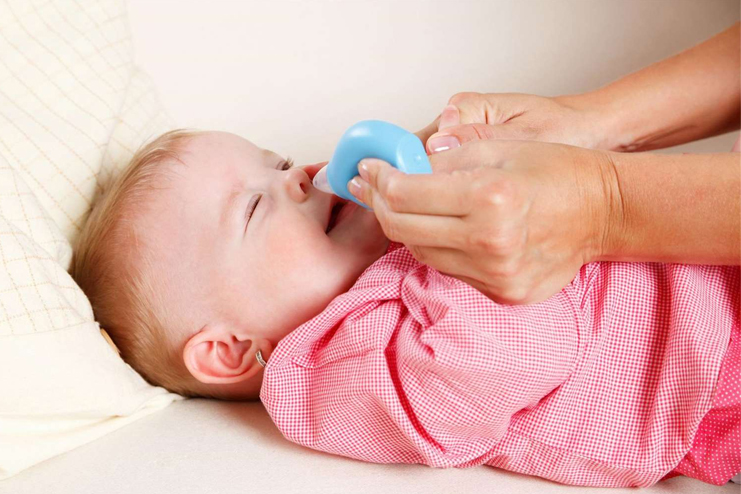
Use the nasal drops that are recommended by your pediatrician. Put 2-3 drops in the nose for every 4-6 hours. This helps to loosen the mucus and clear the sinuses passage.
11. Warm cloth:
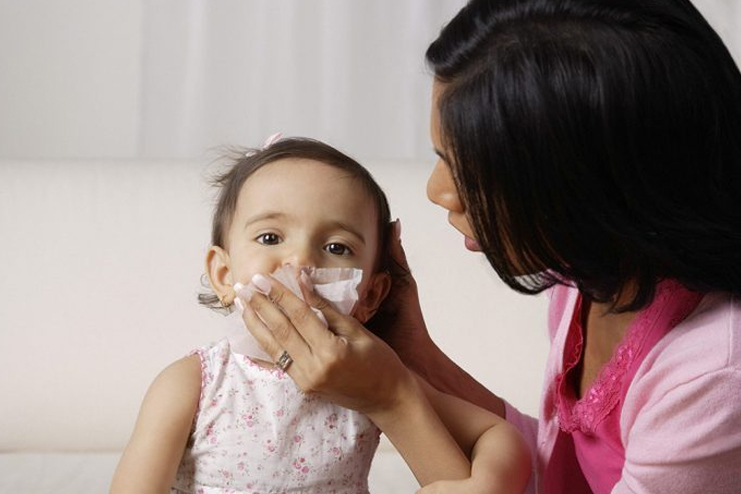
Take a wash cloth and dip it in the warm water. Make sure that the water is not so hot and massage your baby’s face with this cloth. This promotes the mucus draining and keeps the discomfort to a minimum level.
Tips to Prevent Sinusitis in Babies:

Here are a few tips to prevent sinusitis in babies:
- Use saline sprays, washes or both to keep your baby’s nose clear.
- Keep your child away from the smoking
- Wash the bed sheets more frequently in warm water to satay away from the dust.
- Keep your baby away from the things that may cause allergies
- Practice good hygiene habits while feeding your baby
- Keep your child up to date with vaccinations
- Keep your child away from the one who have cold or upper respiratory infections.
In conclusion, sinus infection offers your baby extreme nasal congestion. Look for the symptoms of sinusitis and help your baby to get relief from it with natural home remedies. Visit the doctor if the symptoms remain the same even after the home treatment.







































